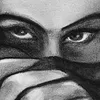From passion to compassion: artist messages on how to find meaning
In Part III of our photo essay on the Spandan art exhibition, we showcase more artworks along with artist insights on their creative process.
Launched in 2014, PhotoSparks is a weekly feature from YourStory, with photographs that celebrate the spirit of creativity and innovation. In the earlier 500 posts, we featured an art festival, cartoon gallery. world music festival, telecom expo, millets fair, climate change expo, wildlife conference, startup festival, Diwali rangoli, and jazz festival.
The works of 14 artists from Karnataka, Maharashtra, Telangana and Kerala were featured this year at Bengaluru’s Venkatappa Art Gallery, in an exhibition titled Incredible Talents. It was organised by the Spandan Global Art and Cultural Foundation from Goa.
See Part I of our earlier coverage and interviews with artists Banani Kundu, Somya Pathak and Deepa Anantakrishnan. In Part II, we featured insights from Devika Sathyavelu, Deepa Singh and Subarna Palai.
Exhibition curator Anant Vikas is also the publisher of the art magazine ArtBeat (‘Spandan’ means heartbeat). In this photo essay, we showcase more works from the exhibition, along with artist insights on creativity.
E. Ram Mohan
“Art is a passion to me. It is my lively interaction with nature and society,” explains Hyderabad-based artist E. Ram Mohan. He has a background in telecom engineering, and is also a self-taught artist.
“In my school days, I had access only to pencils and watercolours. Due to the versatility and transparency of the medium, watercolours became my favourite,” he recalls. He uses wash techniques to portray the beauty of nature. “I want to create a fondness in the minds of the beholders to love nature, whether it is a landscape or wildlife work,” he adds.
For most of his paintings, Mohan takes direct reference from site visits or refers to photographs shared by friends. “For painting a conceptual subject, the teachings of our great philosophers are the inspiration,” he says.
Now retired, he plans specifically to be engaged with art and associate with artist friends and groups. “In the last two years I have participated in around 15 group shows and art camps,” Mohan says.
The Spandan exhibition was his first appearance in Bengaluru. He sees visibility and branding as important steps in an artist’s journey. Mohan also conducts art classes in his colony, which has an art club as well.
“I am very satisfied in my journey as an artist, and am getting good appreciation, awards and rewards,” he proudly says. He cites awards from Dushyanth Gallery, Bindaas Artist Group, and Konaseema Chitrakala Parishat as examples.
Mohan calls for more public and community exposure to art, which will help increase the commercial potential of the art market. His works are priced from Rs 5,000 to Rs 15,000.
For the show at Venkatappa Art Gallery, Mohan displayed four works from his Wisdom series, with messages of love, kindness and compassion. “One work done in mixed media depicts a scholar deep in thinking, reflecting the quest for universal truths through the ages,” he describes.
Another painting conveys Buddha’s message of Radiate boundless love towards the entire world. Other planned works are for exhibitions in Jaipur, Delhi and Nepal. Mohan says he is pleased with the support from curators and the inspiring presence of art lovers.
He advises aspiring artists to carefully to choose the platforms for showcasing their works and promoting their career. “Only through persistent study and practice can we improve our artistic skills, techniques and creativity,” Mohan emphasises.
Piyali Chakraborty
“Art is my life. It sends me to another world when I sit in front of the canvas, I forgot everything else. For me it's a passion,” enthuses Piyali Chakraborty, an art teacher at De Sales Music Academy (DSMA).
“Art is about telling the story of one’s life. It includes social life as well as fantasy worlds and unfulfilled dreams,” she adds.
Piyali started with craft works as a child and now does oil paintings. After coming to Bengaluru, she completed an art course at a fine arts college. “When I travel or even when I think, many things catch my mind’s eye, which I try to bring out through my paintings,” she describes.
Even during leisure time, some ideas pop into her mind. While some may think it can be tiring to sit for a long time while painting, she regards it as a form of meditation and relaxation. “I try to sit for painting at least for an hour or two every day, even if it is late at night,” Piyali explains.
She has 120 canvas paintings to her credit, and has sold most of them. She has participated in exhibitions at Art Houz, Venkatappa Art Gallery, Chitrakala Parishath, and Chitra Santhe. Her artworks are priced from Rs 5,000 to Rs 60,000.
Piyali appreciates the trend of upcoming artists portraying India’s cultural traditions and conveying the beauty of wildlife and forestry. She teaches students at school and at her home to show them the way to their true potential.
She observes that many people tend to like only paintings that they can easily relate to or understand, rather than explore and appreciate other dimensions. It’s somewhat like judging a book by its cover, she laments.
“Audiences need to communicate about artworks with the artist. They should explore the artist’s thought processes in order to expand their horizons and improve their understanding,” Piyali advises.
Reflecting worrying developments related to the environment and conflict, she prepared works such as a painting depicting an elephant losing its happiness due to deforestation. She appreciates the feedback given by audiences and suggestions for new themes. “I have had an amazing journey in all my exhibitions,” she enthuses.
Piyali advises aspiring artists to bring out true and faithful meaning in their works. “Art should not be taken for granted or pursued just for money,” she suggests.
Prasanthi Alluri
“Art is my passion. It connects me to the world around me in beautiful ways, and I truly believe that art can change your perspective of yourself and others,” Prasanthi Alluri explains.
Her style combines both detail as well as simple strokes. “The subject of the painting is often shown in high detail, while the background is usually a combination of abstract strokes,” she says.
“Art shows the hidden complexity of even the smallest of things, be it a handshake or a ladybug. Art is a way to peel back the outer layer of the world and see the turning gears within,” Prasanthi.
She regards a work of art like a camera lens, which can be adjusted so that what is important is clearly captured. “It lets us focus on what the artwork symbolises, and what its main features are,” she adds.
“As an artist, I see success in creating something that changes people’s viewpoints and even inspiring a world-turning moment in people,” she says.
Thought digital art is different from original paintings, Prasanthi finds a lot of inspiration online. “Usually, I choose a theme based on a photograph I may find, and develop it by adding my own ideas and style,” she explains.
"Finding work-life balance can be tough for an artist, but I believe that you can achieve anything if you are passionate enough. I always am sure to keep defined hours specifically for art,” Prasanthi says.
She has done around 40 paintings so far, and hopes to participate in more exhibitions in future. She calls for more art appreciation in India, and better promotion of art events through social media.
The Spandan exhibition was an eye-opener for her. “It gave me experience of the difficulty that goes into putting up the show and getting your paintings displayed. The audience was very appreciative of the artwork, and showed a lot of interest in the techniques as well as the story,” Prasanthi enthuses.
As trends in Indian art, she points to a burst of fusion art. “Artists combine Indian traditions with modern styles to create beautiful pieces of work,” Prasanthi observes. Indian artists have high potential to recreate ancient art forms, such as Madhubani and Kalamkari, in a fresh way.
Prasanthi’s artworks are priced from Rs 20,000 to Rs 30,000. For the Spandan exhibition, she presented four pieces. “Each had an undertone of an untold story, which the audience can piece together with their own experiences,” she says.
She advises audiences to develop their own interpretations since art is as much in the eyes of the viewers as it is in the artist. “That being said, I do think the audience should also try to find out the artist’s point of view, so as to gain a better understanding of the context, method and message,” she adds.
“I would like to tell all aspiring artists to not lose hope, even if the feedback is low. There is someone out there whose life might be changed by your artwork, you just have to find them,” Prasanthi signs off.
Now, what have you done today to pause in your busy schedule and unleash your inner creative voice?











Prasanthi Alluri






Team 'Incredible Talents'
(Note: These photographs from the gallery were taken before the national lockdown due to the coronavirus. The visit to the gallery was not in violation of any public safety guidelines.)
See also the YourStory pocketbook ‘Proverbs and Quotes for Entrepreneurs: A World of Inspiration for Startups,’ accessible as apps for Apple and Android devices.
Edited by Saheli Sen Gupta









